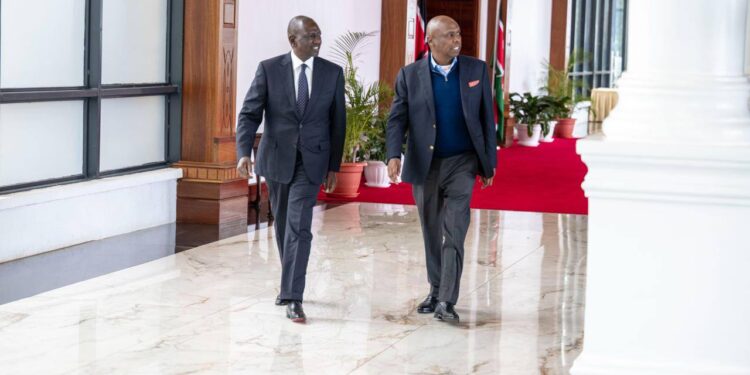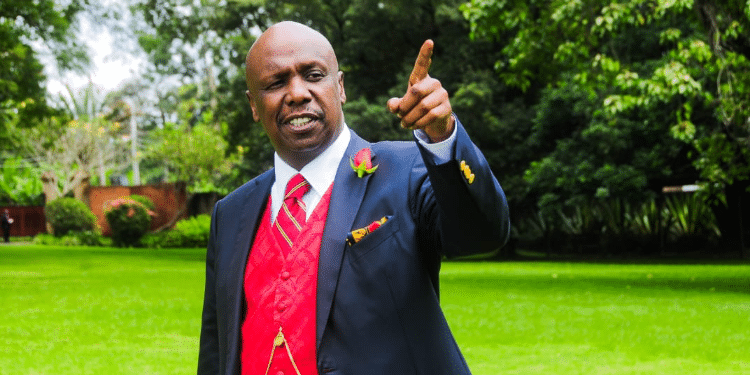
Former Kiambu Governor Ferdinand Waititu and his wife Susan Wangari at Milimani Law Courts. Photo ODP
By Newsflash Team
Former Kiambu governor Ferdinand Waititu has grown weary of the monotonous routine at Nairobi Remand and Allocation Maximum Security Prison.
The daily roll calls at dawn, midday, and dusk have become an unwelcome ritual. Except for minor privileges, he undergoes the same experiences as other inmates.
“I have just come from a mid-morning service at Christian International Church since there is not much else to do here,” he says, reflecting on his morning. The church is housed within the prison walls. “Once you get inside here, you realize you are alone. The people you thought were your friends turn out to be just acquaintances.”
Read more: Ferdinand Waititu: From an influential governor to prisoner
Waititu, once a powerful political figure, now spends his days confined in a space where visitors must declare their identity and relationship to him before being granted access. His presence in prison has drawn widespread attention, particularly after a leaked photo of him in prison attire went viral, unsettling the facility’s top administration.
Fighting for freedom
Waititu has filed a fresh application seeking release on bond as he appeals his 12-year sentence for receiving bribes from contractors and engaging in a conflict of interest while in office. However, his initial application was rejected by Justice Lucy Njuguna on March 3.
Currently, he is just one of nearly 5,000 inmates at the facility. A prison officer explains that security protocols prohibit visitors from carrying mobile phones inside. When a journalist arrives to interview him, the officer leaves for a few minutes to inform Waititu of the visit.
About twenty minutes later, Waititu emerges dressed in the standard prison uniform—a black-and-white striped outfit paired with red slippers. This is a stark contrast to the tailored suits and designer shoes he once wore as a prominent political figure. He sits outside the prison’s documentation center, reflecting on his current situation.
A fall from grace
“My days here have been difficult. I have lost my appetite and dignity. Few people come to visit me because they assume I will ask for money to pay my fine,” he says.
The former governor, once a dominant force in Kenyan politics, now finds himself isolated. “Today’s sermon was about rising above defeat,” he shares when asked about his takeaways from the church service.
“Prison is a place where great ideas die. It mentally torments you. There is no freedom, no proper facilities, and now I know better. When you have resources, people surround you, and you believe you are in control. But it’s all an illusion. People come to you because they think you can solve their problems. Today, for instance, no one has visited me,” he laments.
Despite his circumstances, he remains determined to fight for his release, pushing for bond or bail.
Prison life and survival
Throughout the interview, an armed guard remains close by. Observing his interactions, it’s evident that Waititu has built a good relationship with prison warders, who often refer to him as “Baba Yao,” a nickname he legally adopted before the 2017 elections.
Despite these connections, prison life remains harsh. Tasks he once delegated to others are now his daily reality. He is also cautious about visitors after encountering fraudsters posing as influential figures in the judiciary and politics, promising him freedom in exchange for large sums of money.
Read more: Waititu to remain in custody for Thursday’s sentencing
“The first few weeks were both overwhelming and frustrating. Many believe I stole millions while in office and assume I still have money. Conmen have approached me, demanding between Sh10 million and Sh15 million, claiming they can buy justice for me. But I don’t have that kind of money, and I am confident that one day I will walk out of here free,” he states, eating a fruit cocktail from a plastic container.
Deflecting tough questions
However, Waititu is uncomfortable when questioned about his wife, Susan Wangari, who was also convicted. He quickly shuts down the topic.
“The problem with journalists is that you already have a narrative in mind before the interview. You end up tarnishing people’s character and families. I don’t want to discuss my family here,” he asserts.
Waititu has now spent over a month behind bars after the Anti-Corruption Court sentenced him to 12 years in prison, with the alternative of a Sh53.7 million fine. His wife was sentenced to one year, with an option of a Sh500,000 fine, for dealing with suspect property.
Legal battles and financial losses
Milimani Chief Magistrate Thomas Nzioki further ruled that Waititu, his wife, and their co-accused cannot hold public office for the next ten years. The case, which began in July 2019, centered around a Sh588 million road construction tender awarded to Testimony Enterprise, a company owned by Charles Chege and Beth Wangeci Mburu, during the 2017–18 financial year. The court found that the contract was inflated and predetermined, with Waititu receiving Sh25.6 million in kickbacks through proxies.
Chege was fined Sh295 million or sentenced to nine years in prison, while his wife was fined Sh1.4 million or given a two-year jail term. Additionally, road engineer Lucas Wahinya, who oversaw the project, was fined Sh21 million or sentenced to seven years.
Readd more: Breaking: Waititu sentenced to 12 years in prison for graft
When asked if he regrets any decisions, Waititu is reluctant to dwell on the past. “It’s too late to change anything. Right now, my focus is on regaining my freedom. I miss being free. The confinement is suffocating,” he admits.
But his troubles are far from over. The Ethics and Anti-Corruption Commission is still pursuing a case to seize his assets, estimated to be worth Sh1.9 billion, arguing that they are proceeds of corruption.



